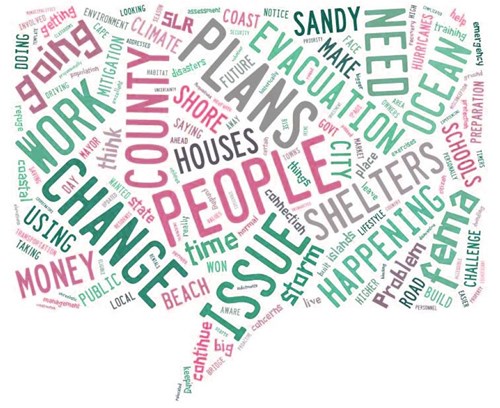Risk Communication
How to communicate the need for resilience
 Talking about climate change, and the need to increase personal and community resilience in the short and long-term, is challenging. How people react to climate change-related topics depends on many things, including their values, political ideology, religious beliefs, personal financial situations, and even whether they personally agree with proposed solutions. Sometimes, when talking about resilience, you may need to not explicitly discuss climate change because the term becomes a barrier to educating certain members of your community. Other times, you may need to break down the message to discuss a specific problem, such as nuisance flooding that occurs outside of storm events.
Talking about climate change, and the need to increase personal and community resilience in the short and long-term, is challenging. How people react to climate change-related topics depends on many things, including their values, political ideology, religious beliefs, personal financial situations, and even whether they personally agree with proposed solutions. Sometimes, when talking about resilience, you may need to not explicitly discuss climate change because the term becomes a barrier to educating certain members of your community. Other times, you may need to break down the message to discuss a specific problem, such as nuisance flooding that occurs outside of storm events.
Simply telling people about climate change and the science behind it is not enough to trigger people to make changes. Often, focusing solely on the science of climate change and potential impacts may hinder people from making changes.[1] Because people often think impacts from climate change will occur elsewhere and not affect them[2], it’s important to highlight impacts already being seen in the region.[3] Finally, it’s very important to be aware of others’ emotional response to the topic, as well as how you, the communicator, responds. Triggering fear, anxiety, or other negative emotions, as well as dismissing any emotional response, could cause people to leave the conversation.[4]
Next: Your audience and why that matters
[1] Wolf, J. and Moser, S. C. (2011), Individual understandings, perceptions, and engagement with climate change: insights from in-depth studies across the world. WIREs Clim Change, 2: 547–569.
[2] Leiserowitz, A. A., Maibach, E. W., Roser-Renouf, C., et al. (2012), Climate Change in the American Mind: Americans’ Global Warming Beliefs and Attitudes in March 2012, New Haven, CT: Yale Project on Climate Change Communication, http://environment.yale.edu/climate/files/Climate-Beliefs-March-2012.pdf
[3] Pike, C., Doppelt, B., and Herr, M. 2010. Climate Communication and Behavior Change: A Guide for Practitioners. The Climate Leadership Initiative.
[4] Moser, Susanne C. "More bad news: the risk of neglecting emotional responses to climate change information", Creating a Climate for Change. Ed. Susanne C. Moser and Lisa Dilling. 1st ed. Cambridge: Cambridge University Press, 2007. pp. 64-80. Cambridge Books Online.